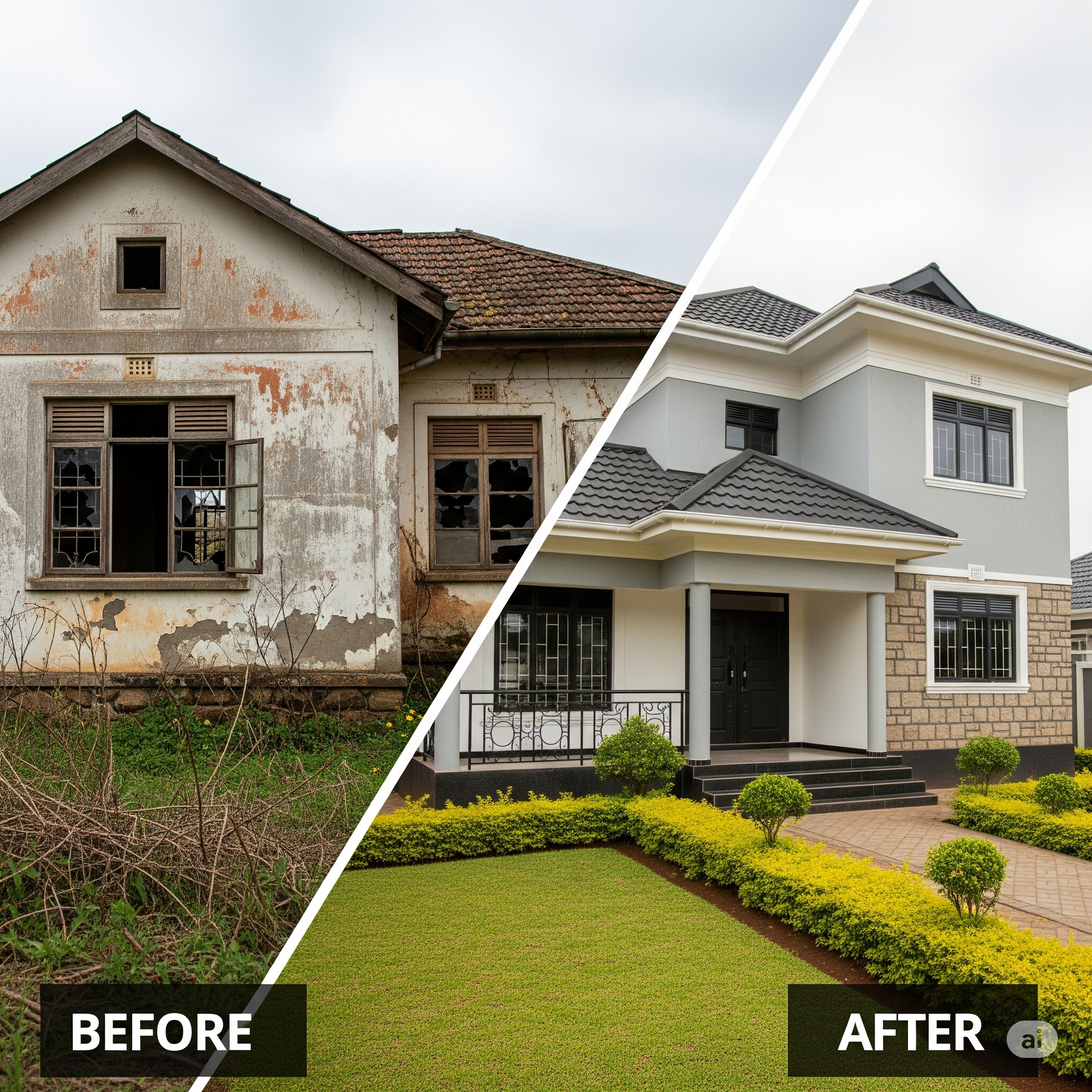In Kenya’s fast-growing property sector, the image of owning a modern, move-in-ready house dominates the dreams of many. Yet, the high costs associated with new builds or prime developments are increasingly pushing budget-conscious buyers to consider an alternative: renovation projects. Also known as fixer-uppers, these older or incomplete homes are quietly becoming one of the most viable, flexible, and profitable property paths for home seekers and investors alike.
Why Fixer-Uppers Are Gaining Attention
The rise in popularity of renovation homes is largely driven by affordability and potential for customization. For instance, many homes priced within the houses below one million in Kenya category tend to fall into this bracket. They may be abandoned, poorly finished, or shell units—but they offer a significant cost advantage for those with the vision to renovate.
Buyers who choose fixer-uppers get the chance to shape their home according to personal taste. In a market where most affordable units follow generic plans, the ability to transform a space into something unique is an underrated benefit. Whether it’s replacing the roof, redoing interiors, installing new plumbing, or adding solar energy solutions, fixer-uppers give owners full creative control over the design and functionality of their space.
Choosing the Right Location: Where Renovation Pays Off
Location remains the most important factor when considering a fixer-upper. As discussed in The Fixer-Upper Formula, not all areas offer equal potential. The best locations are transitional zones—places undergoing infrastructural upgrades or benefiting from spillover growth from nearby towns.
Hotspots include:
- Juja and Thika (near Nairobi’s expanding commuter belt)
- Ruai and Kamulu (close to the Eastern Bypass)
- Machakos and Mlolongo (with active county development plans)
- Nakuru outskirts (as featured in expansion of affordable housing)
These locations strike a balance between low property prices and rising demand, which is key to maximizing your return on investment post-renovation.
Smart Renovation Meets Smart Design
Renovating today is not just about new paint and tiles. Many homeowners are aligning their upgrades with modern trends in smart housing solutions. This includes:
- Solar power systems to reduce electricity costs
- Rainwater harvesting tanks to manage water access
- Space-saving floor plans
- Natural ventilation and daylight optimization
- Use of eco-friendly building materials
These sustainable design choices not only improve comfort and aesthetics but also boost long-term property value, especially as Kenya pushes toward greener development standards.
Legal Caution: Do Not Skip Due Diligence
One of the key risks of buying older or semi-abandoned properties is legal ambiguity. Issues around land title, unclear ownership, or encroachment can derail a renovation project before it starts.
As emphasized in how a title search can save you from a coastal property nightmare, buyers should:
- Conduct a title deed search at the land registry
- Confirm zoning compliance with the local county government
- Check for unpaid land rates or existing disputes
- Engage a property lawyer or licensed surveyor when necessary
This process ensures your renovation investment is legally secure and protects you from costly setbacks down the line.
Budget Advantage: Why Fixer-Uppers Offer More Flexibility
A well-selected fixer-upper often costs significantly less than a ready-to-occupy house in the same area. For instance, while a complete home in a gated estate may fall under the houses for sale below 5 million in Kenya bracket, a renovation property in the same location could be purchased for under KSh 2 million with room left in the budget for upgrades.
This flexibility makes them especially attractive to SACCO members or those using installment plans, who may prefer to renovate gradually rather than shoulder a full mortgage.
Rental Potential and Community Redevelopment
Fixer-uppers aren’t just for homebuyers—they’re excellent options for property investors, too. As highlighted in why abandoned homes might be the smartest investment you haven’t considered, entire clusters of neglected houses can be purchased cheaply and transformed into rental units, student hostels, or even Airbnb properties.
Such projects not only generate rental income but also contribute to urban regeneration. With Kenya’s population growing and housing demand shifting to more affordable options, this presents an opportunity for community-based redevelopment that benefits both investors and residents.
Renovation Is More Than a Budget Choice
The fixer-upper path is no longer just a fallback for those who can’t afford brand-new homes it’s a strategic approach for anyone looking to extract maximum value from the real estate market. It allows entry into prime locations at reduced cost, provides room for creativity, and supports sustainable building practices.
With the right location, careful due diligence, and thoughtful renovations, fixer-uppers can evolve into dream homes or profitable investment properties. In Kenya’s increasingly dynamic housing market, renovation projects offer a path less traveled, but one that holds immense promise.

